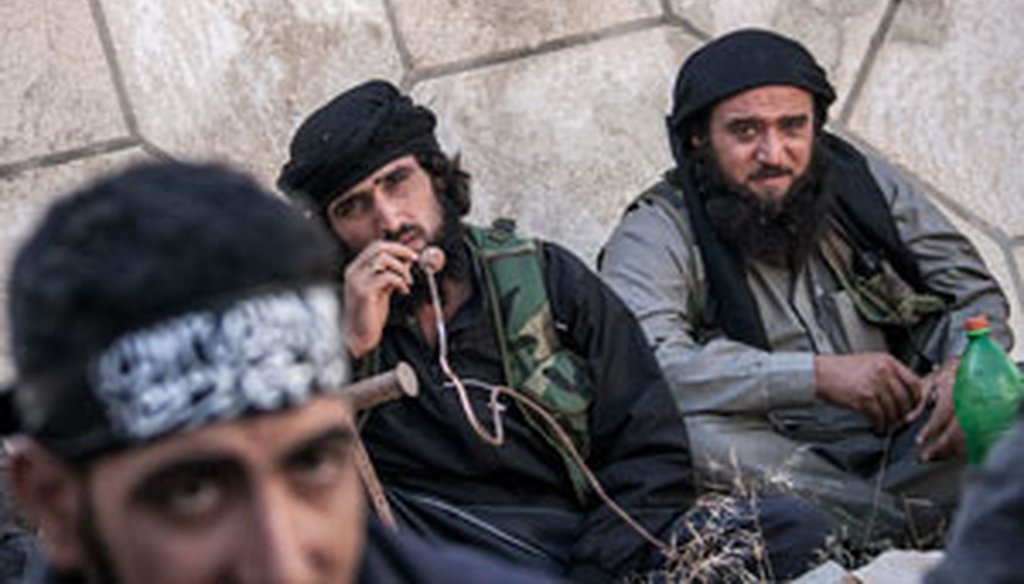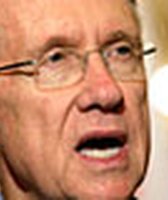Stand up for the facts!
Our only agenda is to publish the truth so you can be an informed participant in democracy.
We need your help.
I would like to contribute

Fighters for the Free Syrian Army, a group backed by the West, aren't the only Syrian rebels battling Bashar Assad. (AP)
How many Islamic extremists are among the Syrian rebels? How many moderates?
At this week’s meeting of the United Nations, President Barack Obama warned Bashar Assad’s rule will lead to "an increasingly violent space for extremists to operate."
Some U.S. lawmakers say that’s already the reality — with important implications for how America should respond.
In Syria’s civil war, it’s not just rebels vs. Assad’s government — but sometimes rebels vs. rebels. Some are U.S. backed, some aren’t. Which brings us to an important question in the Syria debate: Just who are those rebels, anyway?
As lawmakers have attempted to provide answers, we couldn’t help but notice that they’re using a wide range of estimates.
But as with diplomacy, war is no easy fact-check. Lawmakers’ sources tend toward the classified.
One report we saw pegs the total number of rebel fighters at 100,000. Meanwhile, a Democratic lawmaker suggested that there were that many just in the moderate camp.
Sen. John McCain, R-Ariz., who has repeatedly and publicly called for the United States to take a more active role in the conflict, addressed the topic at the Council on Foreign Relations on Sept. 17, 2013, when an audience member raised the issue.
"There’s about 70 percent still who are the (moderate) Free Syrian Army," McCain said. He emphasized that Syria is "a moderate nation," although he had to admit that "there are jihadists going in." He used a specific number for just one group of extremists, saying there are 5,000 Hezbollah fighters in Syria.
McCain justified his assessment of the Syrian people mainly with his personal experience: "I was in Syria, and I met them. I know who they are."
Other leaders have tried to explain the composition of the Syrian rebels by using rough percentages. Secretary of State John Kerry said during a congressional hearing on Sept. 4 that 15 to 25 percent of opposition forces are "bad guys." Rep. Michael McCaul, R-Texas, suggested in a Sept. 10 interview on Fox News that it was higher — that 25 to 50 percent of the rebels are "radical Islamist jihadists."
Kerry supported intervention, while McCaul was arguing against it, saying it would "put us in the middle of a Sunni-Shiite conflict supporting rebels or jihadists."
Sen. Bob Casey, D-Pa., who argues America should support rebels and conduct airstrikes if necessary, offered a more detailed breakdown of moderate rebel forces on Fox News on Sept. 11: "50,000 fighters in the Free Syrian Army, 37,000 to 40,000 in the Liberation Front. So you have at least 80,000 to 100,000 potential moderates."
But he said he might be off "by 10,000 here or there …"
As recently as this summer, CNN reported that David Shedd, deputy director of the U.S. Defense Intelligence Agency, said that while at least 1,200 rebel factions have been identified in Syria, the U.S. ability to distinguish "good guys" from "bad guys" in Syria was limited.
We reached out to several lawmakers and asked them where they got their information. McCaul’s office sent us this: "His information, as he has indicated in several interviews, has come from high-level briefings."
So, we have "high-level briefings" and — in McCain’s case — personal trips to the Middle East. Neither offer the opportunity to independently confirm numbers, and both show how difficult it can be for politicians to back up their claims.
That is why many of them resort to quoting experts from independent research centers or media reports. For example, McCain and Kerry both referred to a Wall Street Journal op-ed by Elizabeth O’Bagy, who frequently traveled to Syria, that didn’t even include numbers. To further complicate the situation, it was later revealed that O’Bagy was affiliated with a group that provides aid to the opposition and that she was fired from her position as a senior analyst at the Institute for the Study of War for lying about her resume.
We also found more recent reports, such as a summary in Britain’s Telegraph of work by IHS Jane’s, a British defense and intelligence analysis agency, which estimated that out of the approximately 100,000 opposition fighters almost half are either jihadists (10,000) or hardline Islamists (30,000 to 35,000).
Charles Lister, a terrorism and insurgency analyst for IHS Jane’s and author of the analysis, described the difficulty with categories of "moderate" and "extremist" in an op-ed for Foreign Policy: "Technically speaking, a very large portion of rebel fighters in Syria would identify themselves as ‘Islamists’ fighting a ‘jihad.’ But contrary to popular Western interpretation, this does not make them ‘extremists’ and certainly not ‘al Qaida.’"
So there are definitional problems.
And where did the experts get their information? Let’s take a look at the report from IHS Jane’s: According to the Telegraph, the study is "based on intelligence estimates and interviews with activists and militants."
Just as with lawmakers, assessments rely on hard-to-confirm interviews and intelligence.
Even observers on the ground in Syria struggle.
We reached out to several journalists who have covered the Syrian conflict directly. Lyse Doucet, BBC's chief international correspondent, told PolitiFact the main problem: "It is impossible to be exact simply because groups grow and shift sides by the day and there are large swathes of Syria now too dangerous to visit."
Another BBC editor and an ABC News anchor told us that while there’s evidence that jihadists are on the rise among rebels, precise numbers are a challenge for anyone.
It’s a shifting situation.
Just this week, Syrian rebel units pushed back against pro-western opposition leaders, said Sam Dagher, a correspondent in Damascus for the Wall Street Journal. He and his colleagues estimate a majority of Syria’s rebels are Islamists who are increasingly distrustful of the West, especially after America’s willingness to strike a deal with Russia over Assad’s chemical weapons.
But "full-on al-Qaida types" are a small minority, he said.
Terry Moran, a news anchor and chief foreign correspondent for ABC News, spent time in Syria earlier this year. "It is an incredibly difficult and chaotic situation to read," he told us. "I don’t even think that the rebel commanders know what the total makeup is."
While Moran appreciates the work done by analysts like IHS Jane’s, he doesn’t believe that there is any way for lawmakers to give an accurate assessment.
"Everybody who stands up and gives an exact number has a political agenda to push."
Our Sources
White House, "Statement by the President on U.S.-Russian Agreement on Framework for Elimination of Syrian Chemical Weapons," Sept. 14, 2013
White House, "Presidential Determination -- Syria," Sept. 16, 2013
White House, "Statement by the NSC Spokesperson Caitlin Hayden on the Presidential Determination with Respect to Syria," Sept. 16, 2013
White House, "Remarks by President Obama in Address to the United Nations General Assembly," Sept. 24, 2013
CQ Newsmaker Transcripts, Sen. McCain Holds Discussion at the Council on Foreign Relations on Recent Developments in Syria, Sept. 17, 2013, subscription only
CQ Congressional Transcripts, House Foreign Affairs Committee Holds Hearing on the Authorization for Use of Military Force in Syria, Sept. 4, 2013, subscription only
CQ Newsmaker Transcripts, Senate Republican Policy Committee Chairman Barrasso Interviewed on Fox News, Sept. 10, 2013, subscription only
CQ Newsmaker Transcripts, Rep. McCaul Interviewed on Fox News, Sept. 10, 2013, subscription only
CQ Newsmaker Transcripts, Rep. McCaul Interviewed on CNN, Sept. 11, 2013, subscription only
CQ Newsmaker Transcripts, Rep. Mike Rogers Interviewed on Fox News, Sept. 11, 2013, subscription only
CQ Newsmaker Transcripts, George Stephanopoulos Hosts ABC's "This Week", Sept. 8, 2013, subscription only
CQ Financial Transcripts, Sen. Paul Interviewed on Fox Business Network, Sept. 12, 2013, subscription only
CQ Financial Transcripts, Sen. Corker Interviewed on CNBC, Sept. 11, 2013, subscription only
CQ Newsmaker Transcripts, Sen. McCain Interviewed on PBS with Host Charlie Rose, Sept. 11, 2013, subscription only
CQ Newsmaker Transcripts, Sen. Casey Interviewed on Fox News, Sept. 11, 2013, subscription only
Quilliam Foundation, "Jabhat al-Nusra li-ahl al-Sham min Mujahedi al-Sham fi Sahat al-Jihad. A Strategic Briefing," accessed Sept. 13
Telegraph, "Syria: nearly half rebel fighters are jihadists or hardline Islamists, says IHS Jane's report," Sept. 15, 2013
Foreign Policy, "Syria's insurgency beyond Good Guys and Bad Guys," Sept. 9, 2013
Wall Street Journal, "Elizabeth O'Bagy: On the Front Lines of Syria's Civil War," Aug. 30, 2013
BBC News, "Syria rebels agree Azaz ceasefire," Sept. 20, 2013
Politico, "WSJ op-ed writer Elizabeth O’Bagy fired for resume lie," Sept. 11, 2013
New York Times, "For News From Syrian Battleground, a Reliance on Social Media," Aug. 30, 2013
Wall Street Journal, "Syrian Rebel Units Reject Pro-Western Opposition Political Leaders," Sept. 25, 2013
PolitiFact, "Has Russia vetoed even simple U.N. press releases about Syria?" Sept. 13, 2013
Email interview with Mike Rosen, communications director for Rep. Michael McCaul, Sept. 13, 2013
Email interview with Kelsey Knight, communications director for Rep. Mike Rogers, Sept. 13, 2013
Email interview with Chuck Harper, foreign relations staffer for Sen. Bob Corker, Sept. 13, 2013
Email interview with Jeremy Bowen, BBC’s Middle East editor, Sept. 26, 2013
Interview with Terry Moran, ABC News anchor and chief foreign correspondent, Sept. 26, 2013
Email interview with Sam Dagher, Wall Street Journal Middle East correspondent, Sept. 26, 2013
Email interview with Lyse Doucet, BBC's chief international correspondent, Sept. 27, 2013





























